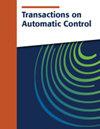Fair-MPC: A Framework for Just Decision-Making
IF 7
1区 计算机科学
Q1 AUTOMATION & CONTROL SYSTEMS
引用次数: 0
Abstract
While control theory can be pivotal in addressing societal challenges and helping policymakers in shaping our future, control schemes must incorporate elements of social justice to be both up to the task and fair. In turn, this requires the formulation of new constraints and control objectives and their integration into existing or new control design strategies. Devising a formally sound framework to ensure social fairness in control can enable a leap in understanding the implications of justice when closing the loop. In this challenging context, we propose and analyze the properties of Fair model predictive control, an economic model predictive control scheme promoting fairness by integrating into the design strategy social fairness metrics, articulated in公平mpc:公正决策的框架
虽然控制理论在应对社会挑战和帮助政策制定者塑造我们的未来方面可以发挥关键作用,但控制方案必须包含社会正义的要素,才能完成任务并实现公平。反过来,这需要制定新的约束和控制目标,并将其集成到现有的或新的控制设计策略中。设计一个正式健全的框架,以确保社会公平得到控制,可以在理解正义的影响方面实现飞跃。在这种具有挑战性的背景下,我们提出并分析了公平模型预测控制的特性,这是一种经济模型预测控制方案,通过将社会公平指标整合到设计策略中来促进公平,并在平等和公平中加以阐述。这允许优化输入序列,平衡公平性和效率,这两者通常是相互冲突的。
本文章由计算机程序翻译,如有差异,请以英文原文为准。
求助全文
约1分钟内获得全文
求助全文
来源期刊

IEEE Transactions on Automatic Control
工程技术-工程:电子与电气
CiteScore
11.30
自引率
5.90%
发文量
824
审稿时长
9 months
期刊介绍:
In the IEEE Transactions on Automatic Control, the IEEE Control Systems Society publishes high-quality papers on the theory, design, and applications of control engineering. Two types of contributions are regularly considered:
1) Papers: Presentation of significant research, development, or application of control concepts.
2) Technical Notes and Correspondence: Brief technical notes, comments on published areas or established control topics, corrections to papers and notes published in the Transactions.
In addition, special papers (tutorials, surveys, and perspectives on the theory and applications of control systems topics) are solicited.
 求助内容:
求助内容: 应助结果提醒方式:
应助结果提醒方式:


